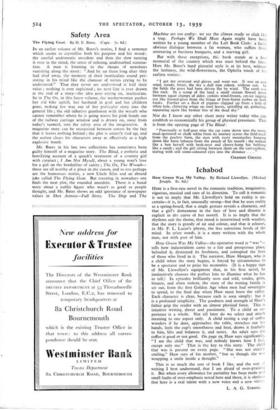Safety Area
The Flying Goat. By H. E. Bates. (Cape. 75. 6d.) IN an earlier volume of Mr. Bates's stories, I find a sentence which seems to crystallise both his purpose and his mood: the careful undramatic anecdote and then the slow turning it over in the mind, the sense of echoing, undisturbed rumina- tion. A man is listening to the shouts of newsboys vanishing along the street : " And he sat there long after they had died away, the memory of their inarticulate sound per- sisting in his mind like the clamour of voices crying to be understood." That they never are understood is half their value ; nothing is ever explained ; no neat line is ever drawn at the end of a story—the idea goes crying on, inarticulate. So in The Ox, in this latest volume, the washerwoman pushes her old bike uphill, her husband in gaol and her children gone, making her way out of her particular story into the general life ; the old talkative gentleman with the wreath who cannot remember where he is going waves his pink hands out of the railway carriage window and is drawn on, away from today's turmoil, into the safety area of the imagination. A magazine story can be recognised between covers by the fact that it leaves nothing behind ; the plot is astutely tied up, and the author clears his characters away as effectively as a high explosive bomb.
Mr. Bates in his last two collections has sometimes been guilty himself of a magazine story. The Blind, a pathetic and horrifying account of a quack's treatment of a country girl with cataract ; I Am Not Myself, about a young man's love for a girl on the borderline of sanity ; The Ox, The Wreath— these are all worthy of a place in the canon, and so too perhaps are the humorous stories, a new Uncle Silas and an absurd joke called The Flying Goat. But creeping in nowadays one finds the neat plot, the rounded anecdote. There is a banal story about a public figure who wasn't as good as people thought, and Mr. Bates shows an odd ignorance of newspaper values in Shot Actress—Full Story. The Ship and The Machine are too crafty : we see the climax ready to click like a trap. Perhaps We Shall Meet Again might have been written by a young member of the Left Book Club : a facile obvious dialogue between a fat woman, who suffers from overeating at business banquets, and a starving girl.
But with these exceptions, this book stands as a fine memorial of the country which was once behind the Here Mr. Bates's hard pictorial style is at its best, without the lushness, the wild-floweriness, the Ophelia touch of his earliest stories :
" I got my overcoat and gloves and went out. It was an east wind, steady, bitter, the sky a dull iron colour, without sun. In the fields the grass had been driven flat by wind. The earth was like rock. In a scoop of the land a small stream flowed down between squat clumps of alder, catkins wind-frozen, cat-ice jagging out like frosted-glass from the fringe of frost-burnt rushes on both banks. Farther on a flock of pigeons clapped up from a field of white kale, clattering wings on steel leaves, spiralling up, gathering, separating again like broken bits of the dead sky."
Nor do I know any other short story writer today who can establish so economically his group of physical presences. This is from the opening page of The Blind:
" Punctually at half-past nine the car came down into the town, mud-spattered or chalk white from its journey across the field-track from the poultry farm, the man with rusty moustaches hanging down like loose tobacco from the pouch of his mouth ; the woman like a hen herself with beak-nose and cherry-hung hat bobbing like a comb ; and the girl sitting between them on the cart-cushion, staring with still stone-coloured eyes into the distance . . "
GRAHAM GREENE.










































 Previous page
Previous page